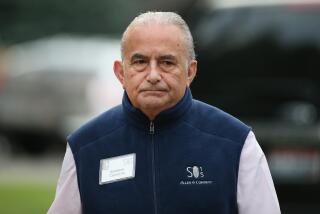Cisneros’ Former Mistress Admits Lying to Buy Home
- Share via
WASHINGTON — The one-time mistress of former Housing and Urban Development Secretary Henry G. Cisneros pleaded guilty Thursday to lying to bankers and prosecutors about her secret purchase of a house in Lubbock, Texas.
Linda Jones and two relatives were indicted in September as a part of a $6-million probe directed by independent counsel David M. Barrett that initially focused on whether Cisneros committed a serious offense when he allegedly misled FBI agents about how much he had paid his ex-lover. The agents were conducting a background check on Cisneros after his nomination to the Cabinet post at the start of President Clinton’s first term.
Barrett’s team of prosecutors cast their net widely and found what they saw as a broad “conspiracy to conceal” the money.
Jones, by agreeing to plead guilty on the eve of trial, was told she will face only three years in prison. If she had been tried and convicted on the multiple counts of bank fraud and money-laundering, Jones could have faced a sentence of more than 25 years.
Her sister, Patsy Wooten, and brother-in-law, Allen R. Wooten, also pleaded guilty Thursday to one count of making a false statement to a bank. They are expected to receive probation.
Cisneros, who left his HUD job late last year and now is president of the Spanish-language Univision TV network in Los Angeles, is scheduled to stand trial Nov. 4 in Washington for allegedly understating his payments to Jones. He reportedly told investigators he never paid Jones more than $10,000 a year, when in fact he paid her $250,000 from 1989 through 1994.
Cisneros and Jones became lovers in the late 1980s while both were married to others. Jones, then known as Linda Medlar, was a political fund-raiser, and Cisneros was mayor of San Antonio. After the affair ended, Cisneros reconciled with his wife but made payments to Jones because, he said, he felt sorry for her plight.
Jones--divorced, bankrupt and unemployed--returned home to Lubbock with her teenage daughter in 1992. Cisneros, who was then working in a private investment firm, sent her several payments totaling $16,000 to be used as a down payment on a house. Her sister agreed to take out a mortgage loan for the $85,000 home, and the Wootens signed the papers as if they planned to live in the house.
When Barrett’s probe of Cisneros got underway, investigators told Jones and the Wootens they were not suspects, and the three agreed to cooperate. Jones was given a letter promising her immunity so long as she and her lawyers helped the prosecutors. Without hesitating, the Wootens also told investigators the details of the home purchase.
Later, however, prosecutors revoked the immunity agreement, saying Jones had not cooperated fully. Then they brought a 28-count indictment against the three, charging them with “bank fraud” in the purchase of the home and “money-laundering” because the house was sold in 1995 for a profit of $8,462.
The payments from Cisneros were not illegal, nor did the indictment allege the bank had lost any money in the transaction.
Nonetheless, their lawyers said Thursday they had little choice but to recommend the plea agreement since their clients had already conceded they made false statements on the mortgage application.
The federal public defender representing Jones said he wanted to fight the charge in front of a jury but agreed it was too much of a gamble for his client.
“I was all ready to go to trial, but the lawyers do not have to serve the prison time if they guess wrong about how it turns out,” said David Guinn Jr.
More to Read
Sign up for Essential California
The most important California stories and recommendations in your inbox every morning.
You may occasionally receive promotional content from the Los Angeles Times.











